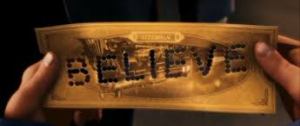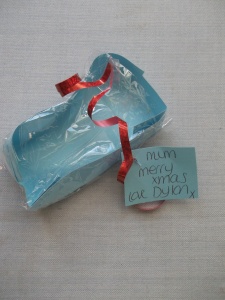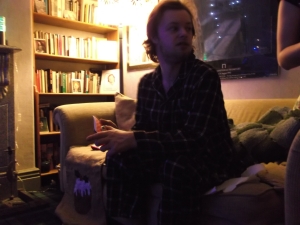 My sister and I stayed up one Christmas Eve to catch Father Christmas. We must have been young enough for him to be plausible (I was six, perhaps, and my sister nine) and although I suspect my sister was already questioning the Santa story, I still believed in reindeer and sleighs.
My sister and I stayed up one Christmas Eve to catch Father Christmas. We must have been young enough for him to be plausible (I was six, perhaps, and my sister nine) and although I suspect my sister was already questioning the Santa story, I still believed in reindeer and sleighs.
We shared a room so it was easy to discuss strategy. Although the plan was that we would stay awake, I fell asleep. I was woken in the night by my sister shaking me. It was very cold and the house was silent. My sister was whispering to me to get up out of bed. She had heard something, she told me. She thought he might have been. I remember that I was anxious. I wasn’t sure that I wanted to catch Father Christmas after all. My sister led me downstairs, shushing me and reminding me about the creaky stair.
Although there was no sign of him, Father Christmas had indeed been; a ‘big present’ had been left beside our pillow cases, which had been filled with small presents. I don’t know who it was suggested that it wouldn’t hurt to open ‘just one’ , although I think we both knew that we ought not to. And I don’t know how it happened that at some point one of us went to fetch our younger brother. Whoever it was, they must have been very quiet and remembered that creaky stair. It was just breaking dawn when I realised, with an empty feeling, that I didn’t have any parcels left to open.
Disappointing
I recall that Christmas as probably the unhappiest of my life. I can still remember the look on mum’s face when she came downstairs and saw the wrapping paper strewn across the floor. My sister and I knew that it had been wrong not to wait until morning for our presents but didn’t realise how important it was that our parents should witness us unwrapping the gifts. I didn’t understand why mum was so upset or why everything about Christmas felt so miserable that year. I was too young to understand that my parents had worked and saved to buy us presents. I thought they were from Father Christmas.
I realised that Christmas that my parents were disappointed, but my belief in Santa survived the incident intact. It must have been the following Christmas, or maybe the one after, that my belief in him was shaken. That year I was opening the presents from my pillow case with mum at my side, watching on. As a child, my only interest was dolls. I had seven which I acted out narratives with all my waking hours. The dolls were real as family to me. My granddad made furniture for my seven dolls and, until I could knit and sew myself, mum and grandma were responsible for making them clothes. The clothes were ‘made to order’. I found pictures of outfits I liked and ordered adaptations for my dolls. Mum somehow found the time to produce my doll clothes as well as look after the three of us.
 The clothes mum and grandma made never disappointed. However this particular year they were responsible for shaking my belief in Father Christmas. Unwrapping my pillow case presents I exclaimed with delight to discover an outfit I had particularly coveted. I can still visualise apricot wool with ribbon at the neck, though I don’t remember which doll it was for. Mum was watching me for a reaction. She need not have worried; it was my best present and better than whatever ‘big’ present I had been given that year. I didn’t thank her though. Instead I told her (thinking that she’d be pleased) that she didn’t need to make it for me after all. Look! Father Christmas had known exactly what I wanted.
The clothes mum and grandma made never disappointed. However this particular year they were responsible for shaking my belief in Father Christmas. Unwrapping my pillow case presents I exclaimed with delight to discover an outfit I had particularly coveted. I can still visualise apricot wool with ribbon at the neck, though I don’t remember which doll it was for. Mum was watching me for a reaction. She need not have worried; it was my best present and better than whatever ‘big’ present I had been given that year. I didn’t thank her though. Instead I told her (thinking that she’d be pleased) that she didn’t need to make it for me after all. Look! Father Christmas had known exactly what I wanted.
Adults can disappoint children just as children can disappoint adults. Mum could have left it there, glad that I was happy with the present and happy to nurse her secret. But she didn’t. She said: Your grandma made that for you Elizabeth. You can thank her later when she comes. My grandma? How did a present from her get into my pillow case? Why didn’t she just give me the present when she came for lunch? But I thought the presents in my pillow case were from Father Christmas I said. Some of the presents were from family, mum told me. This was news to me. Which ones were from family? And how did they get in the pillow case? Did Santa bring them on his sleigh? How did he get them? Nothing added up. I didn’t tell mum, but I didn’t believe in Father Christmas after that.
Receiving
I didn’t fully appreciate the pleasure of giving until I had children of my own. Once I realised how much I wanted to delight my children (and to witness their pleasure) I understood how disappointed my parents must have been the year we opened our presents without them. I learned this lesson with my heart as well as head because by then I had a child who rarely showed any interest in presents. Giving and receiving gifts can be a challenge for some autistic children. For years Dylan showed no interest in presents and the gifts he received would remain untouched. He would run screaming from the room at the suggestion he might unwrap a gift, arm clamped over his head to cover his ears. Eventually we would try to help Dylan to unwrap his gifts, hand on hand. I remember that he would often have his head turned away while we tried to help him remove the wrappings, as if not wanting anything to do with the present.
Looking back I can see that we were doing a lot of things wrong. I don’t think we realised quite how difficult Christmas can be for an autistic child. Now I understand that the sounds, lights and smells of Christmas must have created terrible sensory overload for him. The disruption in routines, especially around meal times and the arrival of visitors, must have been very difficult. And on top of that we were making demands on Dylan to be present and to interact with us (i.e. to unwrap a gift and show some interest in it).
At some point there was a development in Dylan’s response to the gifts he was given; instead of not showing any inclination to open them, he would unwrap them at high speed without looking at the presents. In increasingly record time, Dylan tore through his parcels each year while I desperately tried to make a note of who had given what to him so that I could thank them. It was as if Dylan had understood what was expected of him, but wanted to reduce the amount of time spent on the activity to a minimum. Anyone present at this high speed unwrapping might have been disappointed by Dylan’s apparent lack of interest in their carefully-chosen gift. However, Dylan would return to some of them in his own time.
I can’t remember being disappointed by these experiences but I’m sure that I must have been. It’s natural for parents to want to see their children happy at Christmas and Dylan’s unhappiness and non-participation must have made me sad. My mum, though, was marvellous: the woman who had been so upset with her own children for unwrapping their presents early was now a model of patience. I am glad that as well as showing parental disappointment to me when I was a child she was able to show me parental acceptance when I became a mother.
Giving
Over the years I have adjusted the way we spend the holiday so that it is low arousal and Dylan-friendly. Dylan enjoys Christmas now. He still waits until the end of the day to open his presents but he unwraps them himself and at a reasonable speed. He responds to his gifts, however, without reference to the social conventions of giving and receiving. Dylan’s reaction to a present is straightforward. If he’s interested in it he might hold on to it or take it to his room. Items he isn’t interested in will be dropped or passed to me. Dylan responds to the gift rather than to the giver.
Dylan doesn’t mean to be rude by not acknowledging or appreciating a gift. Because he is incapable of deceit he isn’t able to feign thanks or pleasure. All this means is that we get a more authentic response from Dylan than from the other people we give gifts to (some of whom probably don’t like our gifts much either). I find the emotional honesty of autism and the authenticity of Dylan’s response to others refreshing.
 Although Dylan now understands that he will be given presents to open at Christmas, he hasn’t yet grasped the idea of exchanging gifts. Dylan is a generous person who shares things voluntarily with his sister and me. However, the practice of giving gifts at Christmas seems to be very difficult for him. Although I have involved Dylan in selecting, wrapping and giving to carers, friends and members of the family for many years, he continues to have difficulty with this. Last week he unwrapped presents I had sent in his respite bag for his carers, and he wanted to bring them home again when I collected him. Earlier in the week I found the evidence in his bedroom of a present which he had apparently made for me but which never reached me (it was edible). So in terms of the giving of gifts, we still have some way to go.
Although Dylan now understands that he will be given presents to open at Christmas, he hasn’t yet grasped the idea of exchanging gifts. Dylan is a generous person who shares things voluntarily with his sister and me. However, the practice of giving gifts at Christmas seems to be very difficult for him. Although I have involved Dylan in selecting, wrapping and giving to carers, friends and members of the family for many years, he continues to have difficulty with this. Last week he unwrapped presents I had sent in his respite bag for his carers, and he wanted to bring them home again when I collected him. Earlier in the week I found the evidence in his bedroom of a present which he had apparently made for me but which never reached me (it was edible). So in terms of the giving of gifts, we still have some way to go.
Believing
Much of Dylan’s knowledge about Christmas comes from his children’s books and the Christmas films he watches. Santa is ubiquitous and I’ve wondered whether Dylan’s difficulty with giving gifts is because the only concept he has fully developed in relation to Christmas so far is that of Santa – and there is nothing in the Santa story about children giving presents to adults. Also, because of his learning disability Dylan is functioning at around 5.5 years old cognitively; I’m not sure that I understood the concept of giving at that age.
I’m pretty sure Dylan believes in Father Christmas and that his autism and learning disability are responsible for maintaining this belief beyond his chronological age. So this year, once again, I’ll be celebrating Christmas with Dylan and Santa. One of Dylan’s big passions is Polar Express. He adores the protagonist in the story, who he calls ‘boy’, and is particularly interested in boy’s dressing gown. Dylan has never had a dressing gown before but I’ve decided that this year it will be his ‘big’ present from Father Christmas. It occurred to me that I should try and match this as closely to the Polar Express character as I could, so I took a photo with me last week to shop for a dressing gown and slippers for Dylan.
 I think the dressing gown I bought is a pretty good match. I’ve no idea whether it will get dumped on the floor when the wrappings come off or if Dylan will want me to help him on with it straight away. If Dylan likes the present then it will deepen his appreciation of Santa rather than his mother and that’s fine by me. My only worry is that if Santa has matched the dressing gown too perfectly, Dylan might be looking out of the window all night, waiting for the Polar Express to stop outside our house. And if Dylan is disappointed – well Santa will just have to try harder next year.
I think the dressing gown I bought is a pretty good match. I’ve no idea whether it will get dumped on the floor when the wrappings come off or if Dylan will want me to help him on with it straight away. If Dylan likes the present then it will deepen his appreciation of Santa rather than his mother and that’s fine by me. My only worry is that if Santa has matched the dressing gown too perfectly, Dylan might be looking out of the window all night, waiting for the Polar Express to stop outside our house. And if Dylan is disappointed – well Santa will just have to try harder next year.
Merry Christmas to those of you who celebrate
Happy New Year to all
from Liz and Dylan
Thank you for supporting our blog this year





Reblogged this on Roy F. McCampbell's Blog.
LikeLike
Thanks for the reblog Roy – happy holiday, Liz
LikeLike
Enjoyed your article. ….very worthy of sharing
LikeLike
Enjoy reading your article’s,, hapoy new year x
LikeLike
Hi Kamida – good to hear from you again – glad you’re still enjoying reading 🙂 Happy new year to you too, Lx
LikeLike